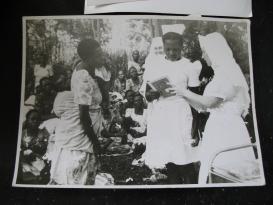Kathleen Vongsathorn's project explored the role of gender in the perception, spread, and adaptation of biomedicine and biomedical knowledge in twentieth-century Uganda. It aimed to develop a better understanding of the role of women in positions of biomedical authority and instruction, and the implications of that role in largely patriarchal societies; to understand the ways that the largely informal biomedical education of women and children by women was received and adapted; and to develop a more complete understanding of the role of women in the promotion of health in Uganda.
Vongsathorn pursued these goals by examining three different types of health education, each of which was primarily the province of European women and the Ugandans they trained: maternal and child health; general health and hygiene; and leprosy treatment and prevention. This includes both the formal biomedical education of nurses, midwives, and medical assistants, and informal education about health and hygiene as it was transmitted through contact at medical centers and homes. She drew upon interviews with former biomedical professionals and elderly Ugandans living in close proximity to old medical centers, and upon the archives of the colonial government and four missionary societies active in biomedical work and education in Uganda.

